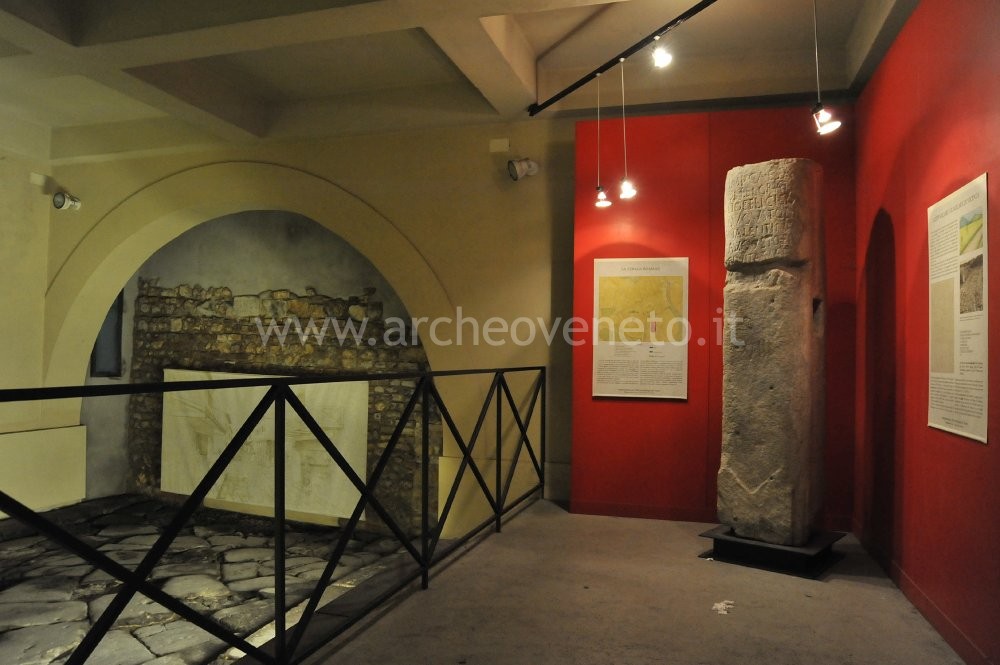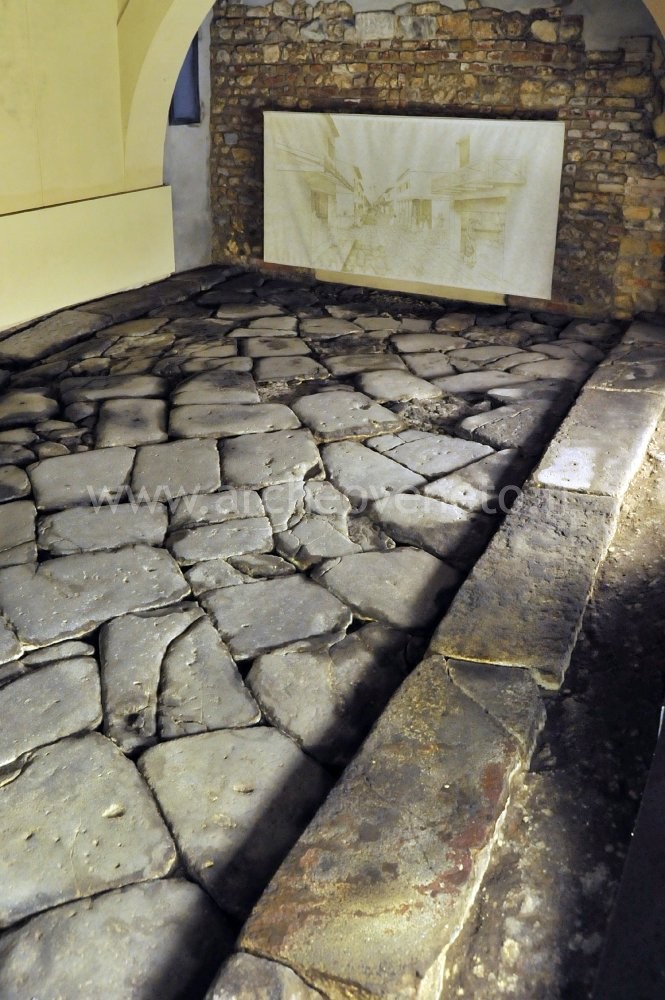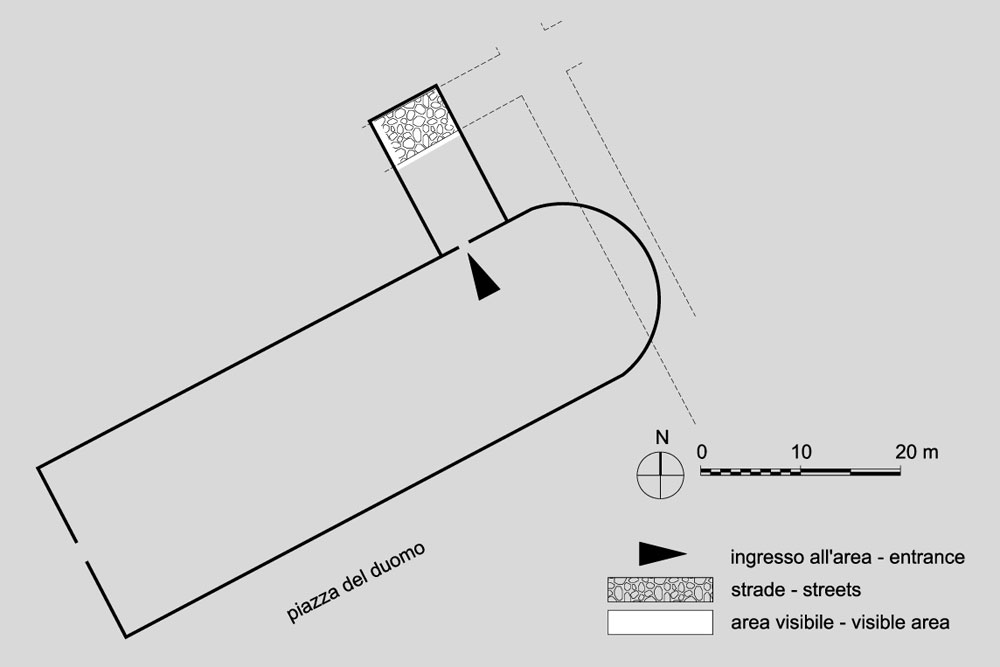|
|
File
Roman houses and street in the Cathedral – Vicenza
|
| Piazza Duomo 8 (Duomo) – 36100 Vicenza (VI)
|
  |
|
Summary

The archaeological area displays the remains of buildings located in the south-western part of the municipium of Vicenza, which can be traced back to a period of time stretching from the late 1st cent. B.C. to late Antiquity. The area was occupied by buildings, which can probably be identified as private houses. Building remains were found under the nave, in the crypt and under the sacristy. At the moment only a stretch of a paved road discovered under the sacristy can be visited.
History of research
The first buildings under the nave and the road were discovered between 1946 and 1948 during the excavation carried out by the Regional Board for the Venetian Antiques (Soprintendenza alle Antichità delle Venezie) of the time on occasion of the building of the new sacristy. In the same years important remains of the Roman period and the early Christian age were discovered under the nave of the cathedral and, thanks to the commitment of the Regional Board for the Protection of the Archaeological Heritage of the Veneto region (Soprintendenza per i Beni Archeologici del Veneto) are currently undergoing renovation works in order to be classified and displayed in a museum. Other buildings of the Roman period, which have also been identified as houses, were discovered between 1975 and 1977 under the crypt; yet after the excavation they were reburied and today they are no longer visible.
Urban and geographical context
Vicenza is located in the west-central plains of Veneto, at an average altitude of 40 metres above sea level. The city is surrounded by the Berici hills on the south and by the south-eastern margins of the Lessinian mountains of the west/northwest. This archaeological area is located in the heart of the modern city and it used to be in the south-western compounds of the Roman settlement.
Chronology
I B.C. (end) – Late Antiquity |

 Under the Cathedral of Vicenza, there are some remains of the south-western neighbourhood of the municipium of Vicenza. The area was divided into four blocks, approximately 80 metres wide and parallel to the Decumanus Maximus, which corresponds to today’s Corso Palladio. The buildings of the Roman period discovered include the remains of walls and floors, which can be probably traced back to private houses, as well as a stretch of a paved road. Under the Cathedral of Vicenza, there are some remains of the south-western neighbourhood of the municipium of Vicenza. The area was divided into four blocks, approximately 80 metres wide and parallel to the Decumanus Maximus, which corresponds to today’s Corso Palladio. The buildings of the Roman period discovered include the remains of walls and floors, which can be probably traced back to private houses, as well as a stretch of a paved road.
The road stretch is located about 3 metres below the current road level. The 3.8 metre wide roadway is paved and displays pavements on both sides, which are about 0.5 metre wide.
The road can be approximately dated back to a period of time between the late 1st cent. B.C. and the early 1st cent. A.D. It is one of the minor roads located in the southern part of the city, running parallel to the Decumanus Maximus, which coincided with the urban stretch of the via Postumia (the current Corso Palladio).
A large archaeological area is located under the nave of the Cathedral; in the 50’s it could be visited, but then it was closed to the public, and it is currently been renovated as part of a long-term renovation and enhancement project commissioned by the Regional Board for the Archaeological Heritage of the Veneto Region (Beni Archeologici del Veneto). Here there are remains of buildings, probably identified as private houses of the Roman period, which, in a complex stratigraphic sequence, were then covered by the remains of the first Christian buildings accomplished before the Cathedral.
|

Admission: Su prenotazione
Visitability: Interno
Ticket: No
 School access School access
Upon reservation
For reservations: Wednesday 10-12 and 16.30-18, Saturday 10-12
Recommended tour time (minutes): 40
 Information boards Information boards
 Guided Tours Guided Tours
Guided tours by the group C.T.G. (Gruppo Animatori Culturali-Ambientali), tel. 0444 226626; reservations: Wednesday 10-12 and 16.30-18, Saturday 10-12
 Educational activities Educational activities
Teaching activities by the group C.T.G. (Gruppo Animatori Culturali-Ambientali), tel. 0444 226626; reservations: Wednesday 10-12 and 16.30-18, Saturday 10-12
 Library and documentation centre Library and documentation centre
| Forlati Tamaro B. 1956, Il Duomo di Vicenza. Ritrovamenti e scoperte, in Il Duomo di Vicenza, a cura di Forlati Tamaro B., Forlati F., Barbieri F., Vicenza, pp. 9-159. |
| Maioli M.G. 1977, Il Duomo di Vicenza: risultati dei saggi di scavo nella cripta, in Aquileia Nostra, XLVIII, pp. 209-236. |
| Mangani E., Rebecchi F., Strazzulla M.J. 1981, Emilia, Venezie (Guide Archeologiche Laterza), Bari, pp. 151. |
| Rigoni M. 1987, Vicenza, in Il Veneto nell’età romana, II, a cura di Cavalieri Manasse G., Verona, pp. 113. |
| Fiaccadori G. 2002, Dalle origini alla prima età gotica, in La cattedrale di Vicenza, a cura di Barbieri G., Vicenza, pp. 9-12. |
| I luoghi della cultura 2006, Roma, pp. 387. |
| Bonetto J. 2009, Veneto (Archeologia delle Regioni d’Italia), Roma, pp. 465-466. |
|



 Information boards
Information boards Guided Tours
Guided Tours Educational activities
Educational activities Library and documentation centre
Library and documentation centre









